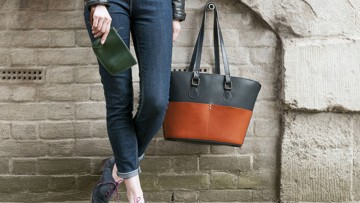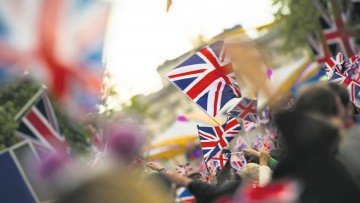Just a few seasons ago, a piece of clothing would have had the manufacturers’ label most prominently displayed in the collar or waistband. Now it has been joined by another, proudly stating its country of origin: “Made in Britain”. Indeed, this label has become desirable in its own right.
“It’s another reason to buy,” argues Douglas Cordeaux, owner of textile manufacturers Fox Brothers, established in Somerset in 1772. “In fact, if it wasn’t the case initially, now there’s a generation genuinely interested in buying clothes, and menswear especially, made using British cloths, too – it’s an investment in skills that otherwise risk being lost.”
That perhaps is the key word: skills. If Britain has suffered a steady slump in heavy manufacturing, specialist engineering aside perhaps, recent times have seen a parallel revival and reappreciation of its traditional handcrafts.
High-end manufacturers
Leather goods, textiles, iron work, pottery and ceramics, for example, have all benefitted from the idea of “mass luxury” that high-end, often fashion-oriented products, no longer sell to an ever-diminishing niche, but rather to an ever-expanding aspirational consumer base.
This has allowed the skills-base not only to survive but to flourish. For example, bespoke tailors, who have long complained of the difficulty of attracting school-leavers to a job that requires more years of training than a doctor, but lacks the glamour of fashion design, are now seeing apprenticeship schemes oversubscribed.
Customers cherish British-made goods now – there is a reassurance and even romance to them
“Making things is part of the British identity, especially the making of things at the finer end of the spectrum, which is what has a real future,” says Mark Henderson, chairman of Savile Row tailors Gieves & Hawkes and founder of The New Craftsmen, a retailer established to sell craft products specifically made in the British Isles.

Accessories designer Rae Jones was determined that Buckitt, the bag company she launched in 2013, would be British made
“Arguably this is about picking up the pieces after the Industrial Revolution destroyed much craftsmanship, a process that is also going on in India, Turkey and China. To push for certain things to be made in one’s home market is about playing to one’s strengths.”
“Reviving our native talents”
Rae Jones agrees. While she concedes that home-grown labour and materials are relatively expensive – such British-made goods are largely for the minority who can afford them – the accessories designer was determined that Buckitt, the bag company she launched in 2013, would be British made. “That was about playing a part in reviving our native talents, but also for sound business reasons,” Ms Jones says. “Generations of practice have meant British makers are very good, in this case, at leather crafting in a way I just couldn’t get abroad. And customers cherish British-made goods now – there is a reassurance and even romance to them.”
The question, she adds, may be whether shoppers are drawn to the quality and value that, in some typically non-mass-manufactured product categories, many British goods embody. A 900-year-old history of shoe-making similarly means Northampton is rightly recognised as a world leader in the craft, for instance. Or are they drawn to other, more esoteric, notions of what “Made in Britain” now represents – a sense of exclusivity, buying local or supporting a national economy in austere times, for example.
While economic interests means the so-called patriotic purchase may hold sway at the moment – for every campaign promoting British-made goods, other countries have their equivalents, from MadeinUSA to a recent multi-million-dollar ad campaign to encourage Nigerians to buy Nigerian – arguably national stereotype has seen a stronger influence as shoppers look for additional reassurance they are spending their limited resources more wisely. The Germans make the best cars, for instance, the French the best wine, Italians the best modern furniture and the UK some of the best craft goods.
National identity
There remain good reasons why past attempts by the European Union to replace such “Made in…” labels with blanket “Made in Europe” ones have been hard fought by makers in those nations for whom national identity brings additional kudos.
So valuable is the idea of “Made in Britain” right now that it is seeing resurgence, even in sectors for which the competition from abroad might be considered overwhelming. In defiance of Swiss dominance, brands the likes of Dent and Bremont are seeking to re-establish the UK’s long-lost pre-eminence in watchmaking.
“Britishness is part of what makes Bremont different,” explains the company’s aptly-named co-founder Giles English. “It is probably too soon to speak of a renaissance, but certainly there is a new credibility for British watches now – people are thinking about them again. After all, there is a huge history in British watchmaking that nobody seems to know about.”
Indeed, maybe that is what really lies behind a renewed interest in British-made goods – timely reminders that, while the UK is increasingly becoming a nation built on the services sector, it still makes things. Manufacturing, in fact, employs 2.6 million people – with the UK also able to claim some 32,000 designer-makers – and accounts for some 10 per cent of national economic output. This still makes the UK the world’s eighth biggest maker of stuff. And good stuff too.
High-end manufacturers

“Reviving our native talents”

